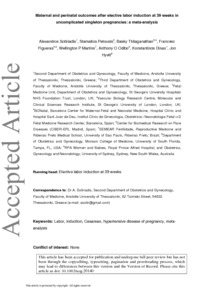Sotiriadis, A; Petousis, S; Thilaganathan, B; Figueras, F; Martins, WP; Odibo, AO; Dinas, K; Hyett, J
(2019)
Maternal and perinatal outcomes after elective labor induction at 39 weeks in uncomplicated singleton pregnancies: a meta-analysis.
Ultrasound Obstet Gynecol, 53 (1).
pp. 26-35.
ISSN 1469-0705
https://doi.org/10.1002/uog.20140
SGUL Authors: Thilaganathan, Baskaran
![[img]](https://openaccess.sgul.ac.uk/110327/1.hassmallThumbnailVersion/Sotiriadis_et_al-2018-Ultrasound_in_Obstetrics_%2526_Gynecology.pdf)  Preview |
|
PDF
Accepted Version
Available under License ["licenses_description_publisher" not defined].
Download (1MB)
| Preview
|
Abstract
Objective
The rate of maternal and perinatal complications increases after 39 weeks' gestation in both unselected and complicated pregnancies. The aim of this study was to synthesize quantitatively the available evidence on the effect of elective induction of labor at 39 weeks on the risk of Cesarean section, and on maternal and perinatal outcomes.
Methods
PubMed, US Registry of Clinical Trials, SCOPUS and CENTRAL databases were searched from inception to August 2018. Additionally, the references of retrieved articles were searched. Eligible studies were randomized controlled trials of singleton uncomplicated pregnancies in which participants were randomized between 39 + 0 and 39 + 6 gestational weeks to either induction of labor or expectant management. The risk of bias of individual studies was assessed using the Cochrane Risk of Bias Tool. The overall quality of evidence was assessed according to the GRADE guideline. Primary outcomes included Cesarean section, maternal death and admission to the neonatal intensive care unit (NICU). Secondary outcomes included operative delivery, Grade‐3/4 perineal laceration, postpartum hemorrhage, maternal infection, hypertensive disease of pregnancy, maternal thrombotic events, length of maternal hospital stay, neonatal death, need for neonatal respiratory support, cerebral palsy, length of stay in NICU and length of neonatal hospital stay. Pooled risk ratios (RRs) were calculated using random‐effects models.
Results
The meta‐analysis included five studies (7261 cases). Induction of labor was associated with a decreased risk for Cesarean section (moderate quality of evidence; RR 0.86 (95% CI, 0.78–0.94); I2 = 0.1%), maternal hypertension (moderate quality of evidence; RR 0.65 (95% CI, 0.57–0.75); I2 = 0%) and neonatal respiratory support (moderate quality of evidence; RR 0.73 (95% CI, 0.58–0.95); I2 = 0%). Neonates born after induction weighed, on average, 81 g (95% CI, 63–100 g) less than those born after expectant management. No significant effects were found for the other outcomes with the available data. The main limitation of our analysis was that the majority of data were derived from a single large study. A second limitation arose from the open‐label design of the studies, which may theoretically have affected the readiness of the attending clinician to resort to Cesarean section.
Conclusions
Elective induction of labor in uncomplicated singleton pregnancy at 39 weeks' gestation is not associated with maternal or perinatal complications and may reduce the need for Cesarean section, risk of hypertensive disease of pregnancy and need for neonatal respiratory support.
| Item Type: |
Article
|
| Additional Information: |
This is the peer reviewed version of the following article: Sotiriadis, A. , Petousis, S. , Thilaganathan, B. , Figueras, F. , Martins, W. P., Odibo, A. O., Dinas, K. and Hyett, J. (2019), Maternal and perinatal outcomes after elective induction of labor at 39 weeks in uncomplicated singleton pregnancy: a meta‐analysis. Ultrasound Obstet Gynecol, 53: 26-35, which has been published in final form at https://doi.org/10.1002/uog.20140. This article may be used for non-commercial purposes in accordance with Wiley Terms and Conditions for Use of Self-Archived Versions. |
| Keywords: |
Cesarean, Labor, hypertensive disease of pregnancy, induction, meta-analysis, 1114 Paediatrics And Reproductive Medicine, Obstetrics & Reproductive Medicine |
| SGUL Research Institute / Research Centre: |
Academic Structure > Molecular and Clinical Sciences Research Institute (MCS) |
| Journal or Publication Title: |
Ultrasound Obstet Gynecol |
| ISSN: |
1469-0705 |
| Language: |
eng |
| Publisher License: |
Publisher's own licence |
| PubMed ID: |
30298532 |
| Dates: |
| Date |
Event |
| 2019-12-02 |
Published |
| 2018-12-07 |
Published Online |
| 2018-10-01 |
Accepted |
|
 |
Go to PubMed abstract |
| URI: |
https://openaccess.sgul.ac.uk/id/eprint/110327 |
| Publisher's version: |
https://doi.org/10.1002/uog.20140 |
Statistics
Item downloaded times since 09 Nov 2018.
Actions (login required)
 |
Edit Item |



